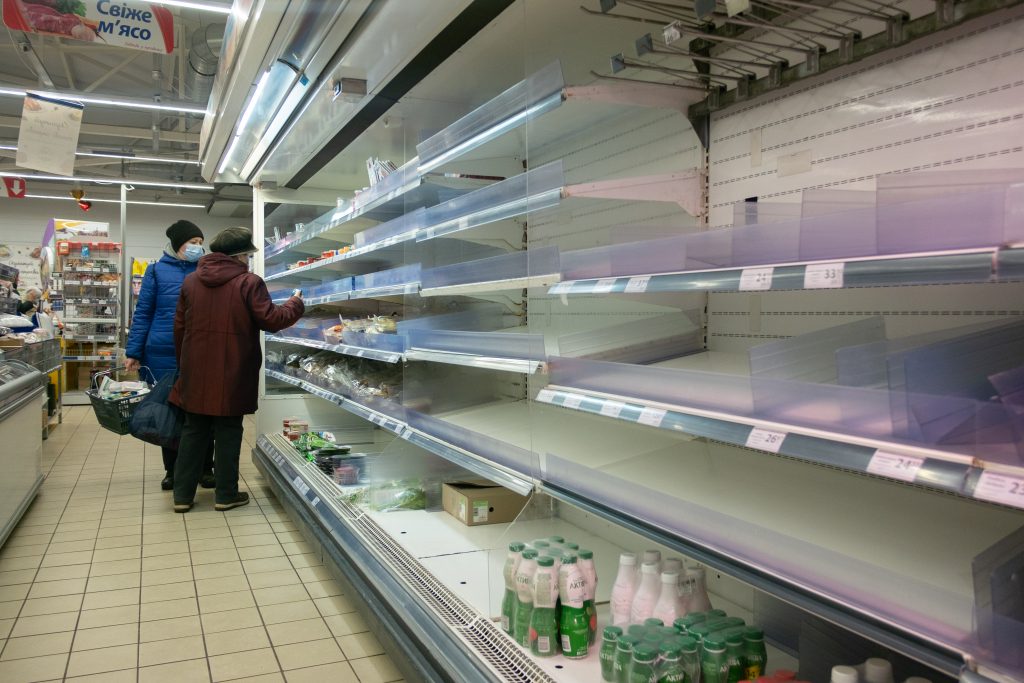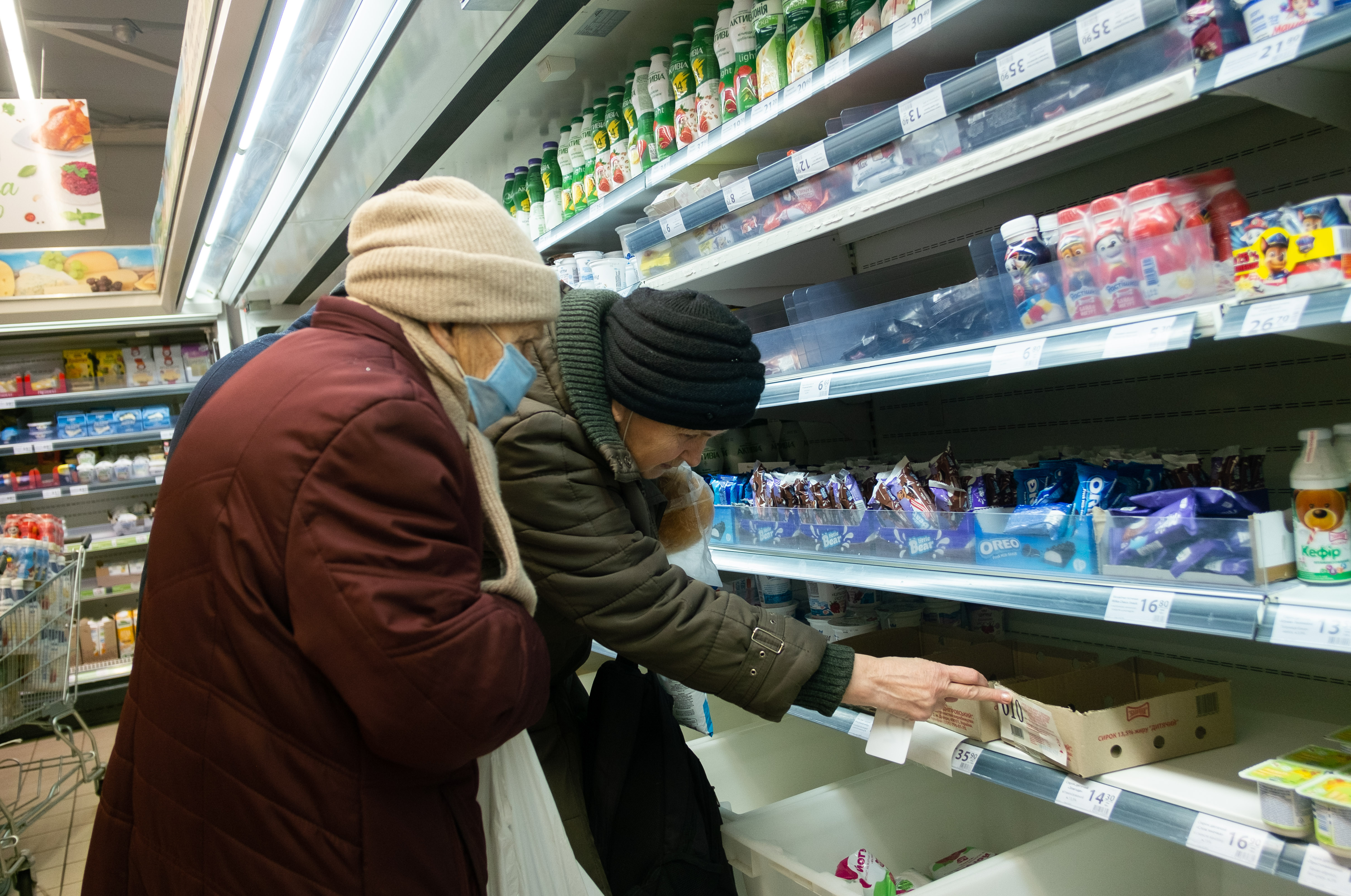A city at war needs more than just weapons.
To survive, a city needs uninterrupted access to food, medicine and other critical goods.
While Kyiv has avoided the worst of Russia’s depredations, which have come close to razing Mariupol and Kharkiv to the ground, the capital city remains the key prize for Russian dictator Vladimir Putin, who wants to take down the national government.
The city is now a fortress that has been all but hopeless for the overextended Russian forces to seize in a direct assault. They have instead attempted to take over the outlying areas and cut the city off from its supply chains, while blasting it into submission with missiles and artillery.
They’ve only been partially successful. Russians have set up to the north and northwest but failed to make meaningful progress in the east, south and southwest. As a result, Kyiv’s civilian supply chains are working at a reduced capacity but they remain largely intact.
On March 13, city officials announced that Kyiv prepared a two-week supply of food for every resident in case of encirclement. Ten days later, the capital has yet to be encircled.
“The southwestern routes are all fairly safe,” said Victor Kevlyuk, a defense expert with the Center for Defense Strategies. “And I think it’s going to stay that way for a long time.”
Reached for comment, Valentyn Mondriivsky, deputy chief of the Kyiv City State Administration, said "the capital has everything that it needs," but refused to go into any additional detail, to avoid giving any actionable information to the Russian military.
Nevertheless, the disruptions are plain to see for anyone who walks into one of the open supermarkets or queues up at a pharmacy.
Availability became a crapshoot and it’s hard to predict when any store might be carrying certain goods. While the shelves in several local supermarkets seen by the Kyiv Independent look more than 60% stocked, the difference from their peacetime inventory is evident.

Fresh vegetables are especially at a premium. Many are frequently unavailable. As new ones are delivered, they are bought up quickly or are moldy and damaged.
However, stores have stepped up their attempts to supply customers with staples. For example, Silpo, one of Ukraine’s biggest supermarket chains, has been giving away certain bags of pasta for free.
"We try to stock products both in our logistics centers and in stores," said Ivan Palchevskyi, a spokesman with Fozzy Group that owns the Silpo chain. "Grains, flour, pasta, sugar and water are especially relevant for wartime. Last weekend, there was a large delivery of food to the capital. At the moment, the situation is under control from our side."
Despite his reassurance, Silpo has decided to temporarily close 22 stores in Kyiv, six stores in Kyiv Oblast and two in Chernihiv Oblast as of March 21. Palchevskyi noted that 115 supermarkets continue to operate in these areas.
"One of the main reasons is the decrease in the number of people in Kyiv, many of whom have left the city," he said. "We continue to deliver goods to Kyiv, although it takes longer than usual. The number of supermarkets that remain operational is sufficient to meet the demand."
About two million people, or about half of Kyiv’s population, have fled the capital since the war started, according to the mayor’s office.
With the sky and the sea no longer safe for aircraft, Ukraine relies on roads and railways for its logistics. Rail is especially important, given its more predictable schedule, higher tonnage capacity and lack of obligation to stop at every checkpoint along the way, said expert Serhiy Vovk of the Center for Transport Strategies.
Vovk noted that national rail carrier Ukrzaliznytsia's work with private companies to bring goods in from neighboring European countries and load them into container cars has been especially important in supplying Kyiv and other cities.
He also pointed out that Ukraine has greatly simplified the import of critical goods like food, obviating the laundry list of bureaucracy and customs declarations that previously had to be filled out.
But roads also remain important. Palchevskyi said that Silpo ships about 200 truckloads worth of goods across the entire country every day. In the past week, they have delivered thousands of pallets of sugar, baby food, flour, water, grains, fresh fruits and vegetables, milk products and sweets.
“We continue to negotiate on imports and deliveries within the country. Our range changes as the war demands,” he said. ”But we still want our guests to have tasty things on their tables. Therefore, fresh fish, bananas, avocados and our imported coffee are in our warehouses.”
Palchevskyi said that the company's logistics system is continually adapting to the situation. While safe delivery routes have been partially preserved or are being restored, the process of delivery itself takes a very long time.
"We turned to international partners and companies with a request to provide us with trucks as humanitarian aid,” he said. “In addition… We are interested in new suppliers who will be able to bring products directly to supermarkets using their own transport.”
Companies wishing to partner up and help can find the necessary contacts on the websites fozzy.ua and silpo.ua.
“We are waiting for new partners to feed the country together," said Palchevskyi.













